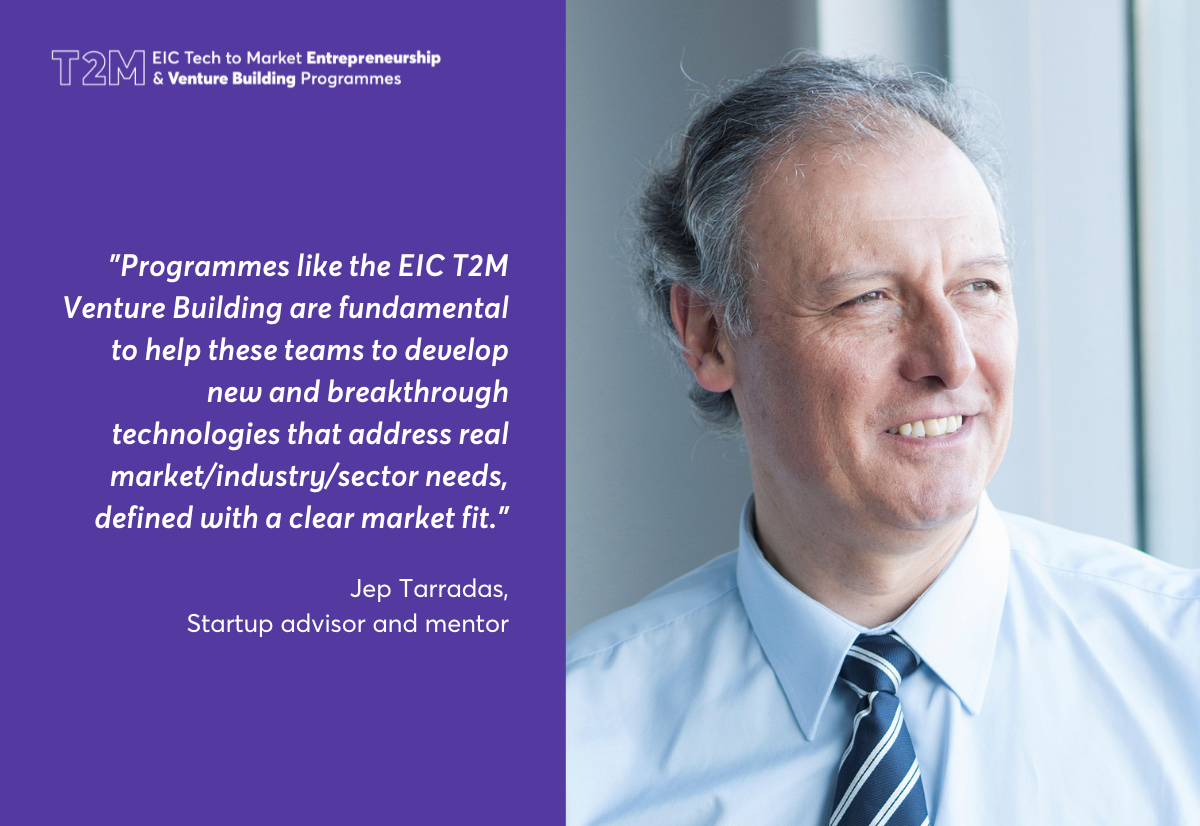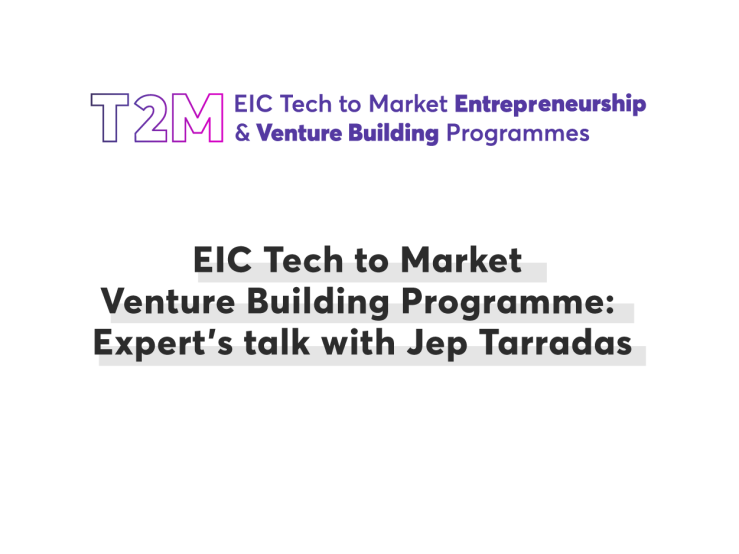The EIC Tech to Market (T2M) Venture Building Programme aims to support EIC Pathfinder & Transition beneficiaries in their journey to transform their scientific results into innovations which may lead to the creation of a successful spin-off company. The Programme is composed of 4 main phases – Tech Demo Days, Opportunities’ exploration, Team creation and Venture support services.
In the Opportunities’ exploration phase, experts evaluate and offer recommendations on the project’s feasibility from a technical, team, and business perspective to guide participants to the most helpful next step. We spoke with Jep Tarradas, an expert that is currently taking part in this phase’s activities, to know more about his experience collaborating with the Programme.
With more than 30 years of experience at HP in different executive roles with global responsibilities, Jep Tarradas is now a startup advisor and mentor, collaborates with entrepreneurship programmes. Jep also works with Revo New Business Models in his role as Vice President of Strategy and Technology, offering consulting services in Business models and Product development. Jep Tarradas teaches at IESE and ESADE business schools in the executive MBAs. In the last 3 years, Jep has also been collaborating with the MWC The Collider in their programme dedicated to venture creation.

Can you briefly describe your role in the EIC Tech to Market Venture Building programme?
This has been my first participation in the EIC T2M Venture Building programme, as an expert to evaluate 2 projects included in the Opportunities’ Exploration Phase.
This role is always a good experience because I not only evaluate the project status and value and identify those with more potential to become startups or spin-offs, but I also contribute with suggestions from my experience and the perspective of a corporation to better state and present the potential of the projects to investors.
I also help the project’s representatives to focus on areas beyond the disruptiveness of the technology, areas like the problem or opportunity, to define a differentiated and sustainable value proposition, to state the market value, market potential, the team expertise, and dynamics, what is the killer application, to define a roadmap of introductions to the market, among others. All the above are necessary for a successful product launch.
What did you find interesting in the innovations that you’re working with in the Opportunities’ Exploration phase?
In general, I found 3 things in common between these projects: a passionate team for problem resolution and technology, very disruptive technological projects in different industries/sectors, and the willingness to move it forward despite the incredible time, budget and effort required to validate their value proposition and market fit.
What do you see as the main strengths and points for improvement in these projects?
As main strengths, besides what I said in the previous questions, I will add that they bring passion for the problem they are trying to solve, they make sure they understand the problem or opportunity, and, more importantly, they have a solid background of the technology used to provide a solution.
The areas they need to work on in general are not those that the scientific community is used to dealing with. These areas are usually along the lines of where programmes like the EIC T2M provide help, the necessary business acumen, getting market insights by going out and talking to industry and experts to validate or not their hypothesis, and the strategic guidance that researchers often lack.
Another important point to mention is the team, creating an environment, where technical expertise and entrepreneurial spirit work together. This helps ensure that the innovations born in research institutions make it to the market and have a significant social and economic impact.
What key advice would you give to researchers that are thinking of starting a business with their technologies or innovations?
The number one thing you need to do is a pitch deck. It’s a shorthand for all the questions we’re going to ask. There are probably seven or eight things that everybody is going to ask about, and you need to have that well nailed down. You should go through it with a bunch of other people first and make sure that you’ve hit all the main points. Practice, practice, and practice.
A simple thing you should also do is be aware of your competitors. Often companies are asked “Who are your competitors in this space?” and they say, “Nobody, no one’s ever done this before.” Venture people see a lot of companies and apps that do similar things across the world. It’s common that startups don’t know where they compete once they leave their region. It shows a lack of diligence on the part of the startup when entering new territories and markets. You’d have to really go out of your way to convince them that this has never been done this way before. You would need a protective moat around you in such a way with patents and trade secrets that no one could enter your space and destroy you.
Above all, VCs invest in teams first. Do we have a great team? Have these people done this kind of thing before or are they just out of school and they’ve never run a company, never had employees, and never managed anybody? You must be able to answer all the questions, so ideally, have someone in the team or as an advisor that’s coming from the industry that they’re trying to solve the problem for because they’re just going to know it well.
Finally, find out what the investor you want to meet with cares about. Target the investors who would be interested in what you have.
How do you see the importance of programmes like the EIC Tech to Market Venture Building to support researchers with cutting-edge innovations enter the business market?
In my experience and, more important even, with the feedback from the projects, spin-offs, and new companies I have worked with, these programmes are fundamental to help these teams to develop new and breakthrough technologies that address real market/industry/sector needs, defined with a clear market fit. When pushing technology to the market without clear market needs or opportunities is like pushing a rope, you go nowhere.
The other critical aspect of programmes like the EIC T2M is to make sure that researchers are looking at all aspects required to launch successful products or solutions into the market and especially in those areas where they do not have solid experience like who is their target customer, how to approach them, what is the real investment required to investigate, develop, validate and launch a product or even better a series of products or the potential revenue plan and P&L among others.
About the EIC Tech to Market (T2M) Venture Building Programme
The EIC Tech to Market Venture Building Programme aims to help build start-ups to exploit promising research results through venture building services, comprising a range of activities from identification of promising business ideas to venture creation and development.
If you’re interested in knowing more about the Programme and our open calls, please visit our page in the EIC Community.
Need help?
For additional information, please refer to our helpdesk by choosing “EIC T2M Venture Building Programme” as the subject.

DISCLAIMER: This information is provided in the interest of knowledge sharing and should not be interpreted as the official view of the European Commission, or any other organisation.

